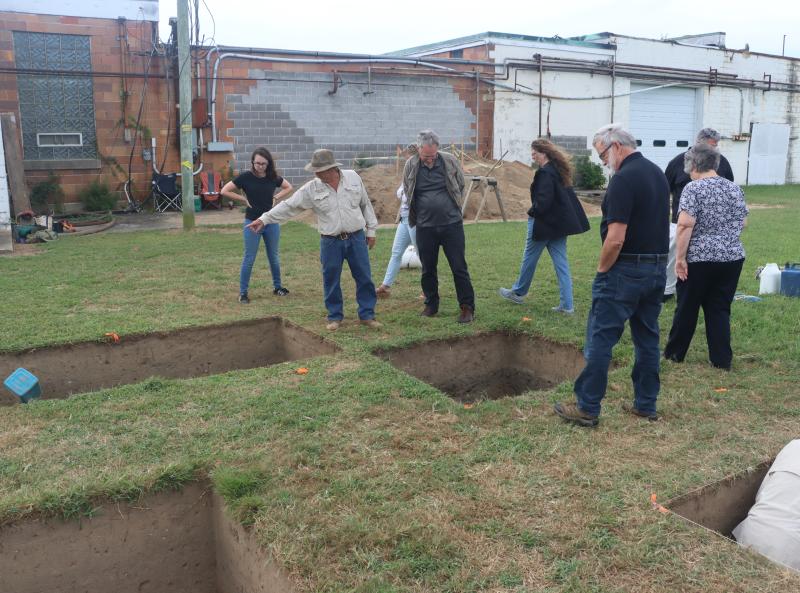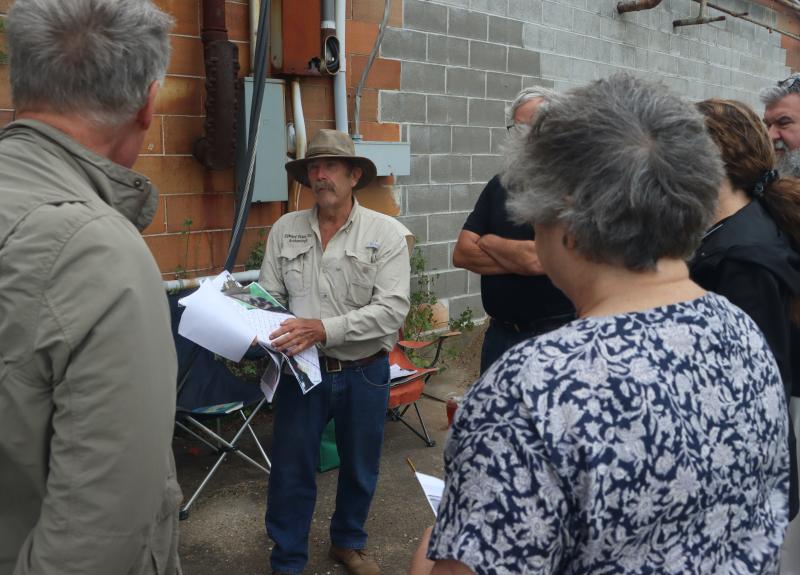DNREC denies request for details of Wolfe Neck archaeological dig
The head of the archaeological dig at the former Lewes Dairy site on Pilottown Road says there is no sign that a 1631 Dutch fort was ever there.
Edward Otter and his team of volunteers and experts have been excavating the site for about seven weeks.
“In our excavation, there is no evidence of a fort here. We haven’t found anything that can be dated to the 17th century,” he said.
The team has been retracing archaeological digs that were done on the site in the 1950s and 1960s.
“Trust me, I would love to be the guy who said, ‘I found it, I found it,’” Otter said.
Otter made the announcement during an open house at the site Aug. 31. He invited state and city leaders to come and see the site for themselves. Otter showed them what his team found, mostly more modern rusty nails, and pieces of glass and pottery.
Otter was hired to do the archaeological survey ahead of the planned Roosevelt Landing development. According to the preliminary site plan, the major subdivision would be built on 3.3 acres and have eight single-family home lots. The plan is currently moving through the city and state approval processes.
“We were very clear that we [wanted] an archaeological assessment done before any development,” said Richard Innes of the Lewes Planning Commission. “I’m so glad we did, even if it’s to affirm that we didn’t find what we expected to find.”
Otter said he believes the fort is actually on the water closer to Broadkill, along Lewes Creek.
“[The Dutch] would have sailed into the mouth of the creek, gone onto the hard land and put up a fort right there,” he said.
Otter said the Dutch fort was built by 32 men. He said they were wiped out by the native population in less than a year.
Archaeologist Craig Lukezic, who was there to observe the excavation, said while he agrees with Otter’s assessment of the findings, there is still a slight chance further investigation could uncover the fort.
“I just want to caution that for this kind of time period, people who were only here for six months, they really wouldn’t leave many things behind,” he said.
Lukezic said Otter and his team will continue excavating, for now, looking for what archaeologists call features, items like human remains.
Gwen Davis, deputy state historic preservation officer and an archaeologist, said she is looking forward to seeing the final analysis.
“I’m just glad the research is getting done. This site is threatened,” she said.
FOIA request denied
Meanwhile, those wondering what was found during an archaeological survey in the Wolfe Neck area are going to have to wait longer to learn more as the Delaware Department of Natural Resources and Environmental Control has denied a Freedom of Information Act request from the Cape Gazette for more details.
In rejecting the request, DNREC said, “If the director has reason to believe that disclosure of the exact location or nature of an archaeological resource would lead to vandalism, pilferage, damage or otherwise pose a risk of harm to the resource or to the site at which the resource is located, regardless of ownership of the property, the director may: (1) Elect not to disclose such information to the public; (2) Provide the public with only general information about the resource and/or its location, when notifying the public of a restriction or closure of access to a state archaeological resource ... or under provisions applicable to shipwrecks to which the state has title.”
At a Lewes Board of Public Works workshop Aug. 9, Sussex County Administrator Todd Lawson said, “What they found maybe changes the history of the property in the sense that what we thought was happening there and what was happening in the region may be changed because it linked the past to something else.”
The archaeological survey was done near Sussex County’s Wolfe Neck wastewater treatment plant. The state also has plans to add a new loop trail off the Junction & Breakwater Trail in that area.
The Lewes BPW is negotiating with the county to form a partnership to upgrade Lewes’ wastewater treatment operation. The option they are focusing on would include installation of an ocean outfall pipeline from Wolfe Neck, under the Lewes-Rehoboth Canal and Cape Henlopen State Park to the ocean. No decision has been made.
DNREC plans to conduct a second, expanded archaeological study in the Wolfe Neck area this fall.
According to Lawson, the entire area could be off-limits to any project depending on the results of that study.
Bill Shull has been covering Lewes for the Cape Gazette since 2023. He comes to the world of print journalism after 40 years in TV news. Bill has worked in his hometown of Philadelphia, as well as Atlanta and Washington, D.C. He came to Lewes in 2014 to help launch WRDE-TV. Bill served as WRDE’s news director for more than eight years, working in Lewes and Milton. He is a 1986 graduate of Penn State University. Bill is an avid aviation and wildlife photographer, and a big Penn State football, Eagles, Phillies and PGA Tour golf fan. Bill, his wife Jill and their rescue cat, Lucky, live in Rehoboth Beach.
















_0.jpeg)



































